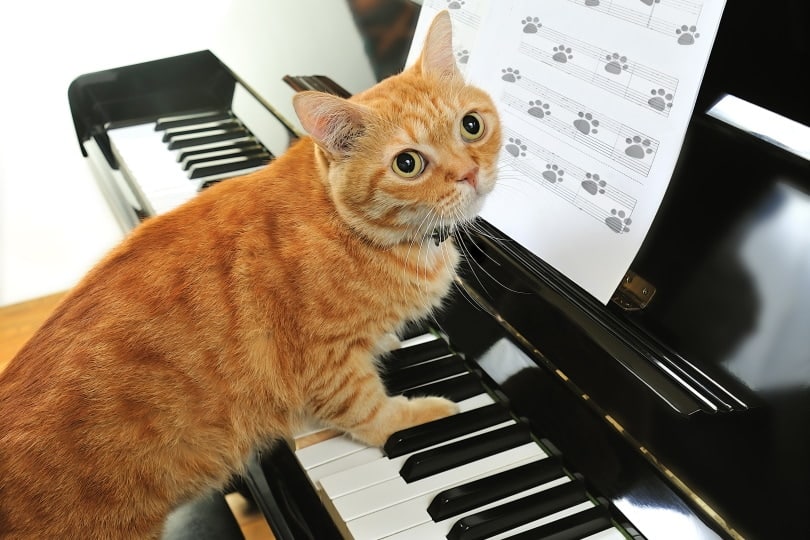With a sense of hearing that is at least three times more sensitive than humans, cats pick up on many sounds that we don’t. They may be intrigued by the sound of a mouse squeaking inside your walls, but have you ever wondered how your cat feels about distinctly human noises, such as piano music? Every kitty is different, of course, but research suggests that cats find some piano music soothing.
Keep reading to learn what science tells us about cats and music, including how your pet could benefit from listening.
Cats and Piano Music: What the Science Says
Traditionally, it’s been thought certain types of music, such as classical and piano, are soothing to cats and dogs. For example, experts often suggest playing music to drown out the scary sound of thunderstorms or fireworks. Animal shelters may play classical music to calm down the stressed cats in their care.

Research From England
Two scientific studies from the past few years offer some insight into music’s impact on cats. In 2015, researchers in England studied how cats undergoing surgery responded to three genres of music: classical, pop, and heavy metal.
Based on physical responses like breathing rate, they determined that classical music most soothed the cats. The piece used in the research was heavy on strings instead of piano, but a soothing melody may come from either instrument.
Research From Wisconsin
Further insight into the types of music cats enjoy came that same year from scientists at the University of Wisconsin. These researchers discovered that cats respond best to music with the same frequency and tempo they would naturally use to communicate.
With this knowledge, composers have created music, often including piano melodies, specifically for cats. Cats tend to be much more interested and entertained by this species-specific music.

How Piano Music Could Benefit Your Cat
Piano music, especially sounds designed specifically for cats, may offer several benefits for your cat. If your cat is left alone during the day, it is essential to provide enrichment and stimulation to keep them busy and entertained. That includes offering toys, food, and visual enrichment, such as a window to look out of.
It could also include sound enrichment, such as recordings of nature sounds or cat-specific piano music. Because your cat’s hearing is so sensitive, they could become scared or anxious by noise outside the house, such as construction or barking dogs. Consider playing calming classical or piano music to help soothe your kitty and drown out these sounds.
Choosing Piano Music for Your Cat
If possible, play your cat piano music composed specifically for them, as outlined by the research study we mentioned. Besides this music, your cat is likelier to enjoy quiet, peaceful melodies rather than stirring and emotional compositions. Remember, your cat’s ears are better than yours, and a song that you find enjoyable could be too loud and painful for your kitty.
Keep the volume low when you play music for your cat. It’s more the consistency and the soothing tempo your cat will respond to if they like the sound of piano music.
Conclusion
Your cat’s personality will play a role in whether they enjoy the sound of piano music. Science suggests they will, but cats have been known to behave unexpectedly, as most kitty owners know all too well. If you want to try playing piano music the next time your cat is left alone, play some while you’re home and observe how your cat responds first.
Cats that seem interested or unbothered by the sound may enjoy having music playing while you’re away. However, if your cat hides or seems stressed by the unfamiliar piano sounds, consider other options for sound enrichment, such as nature noises.
Featured Image Credit: JordiStock, Shutterstock










